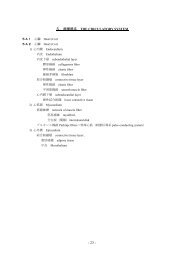Program / Abstract Book - KMU WWW3 Server for Education ...
Program / Abstract Book - KMU WWW3 Server for Education ...
Program / Abstract Book - KMU WWW3 Server for Education ...
You also want an ePaper? Increase the reach of your titles
YUMPU automatically turns print PDFs into web optimized ePapers that Google loves.
Establishment of Reference Intervals: Still a<br />
Challenging Issue! (Beckman Coulter)<br />
Kiyoshi Ichihara and Jeong-Ho Kim (Chairpersons)<br />
1) What is an optimal protocol <strong>for</strong> the IFCC global study on reference values?<br />
Kiyoshi Ichihara, MD & PhD (Japan)<br />
2) Controversies over statistical methods <strong>for</strong> derivation of reference intervals.<br />
Swarup A Shah, PhD, and Tester F Ashavaid, PhD (India)<br />
3) Analytical issues in conducting the multicenter studies on reference values.<br />
Kiyohide Ishikura, PhD (Japan)<br />
4) Age-specific reference intervals: derivation <strong>for</strong> pediatric population from the hospital in<strong>for</strong>mation<br />
system.<br />
Jeong-Ho Kim, MD & PhD (Republic of Korea)<br />
Although global ef<strong>for</strong>t led to standardization of many of the common laboratory tests, their reference<br />
intervals (RI) remain widely variable amongst laboratories. This reflects difficulty in deriving RIs by<br />
individual laboratories and highlights the necessity of deriving it collaboratively <strong>for</strong> common use. The<br />
guidelines used <strong>for</strong> defining, establishing and verifying RIs are available, which was published by CLSI<br />
in collaboration with IFCC. There is a strong global need <strong>for</strong> establishment of proper RIs <strong>for</strong> common<br />
use by conducting multicenter studies. However, there remain controversies on various aspects of<br />
conducting the study.<br />
In this symposium, Prof. Ichihara presents the common protocol <strong>for</strong> the global multicenter study on<br />
RIs, which is proposed as well as currently being conducted by Committee on Reference Intervals and<br />
Decision Limits (C-RIDL) of IFCC. In order to validate the protocol, the following aspects will be<br />
discussed: 1) criteria <strong>for</strong> recruitment of healthy volunteers, 2) ways of controlling pre-analytical<br />
variables, 3) harmonization of results across collaborating countries based on common measurements of<br />
a panel of sera, 4) methods <strong>for</strong> secondary (posteriori) exclusion based on test results, 5) transference of<br />
the established RIs based on a “mini panel” of sera.<br />
Dr. Ishikura, a member of C-RIDL, will present an overview about the feasibility of the panel-of-sera<br />
strategy in harmonizing results worldwide, and will also discuss the possible use of mini-panel in the<br />
transference of established RIs.<br />
Dr. Shah and Dr. Ashavaid will talk on the controversies over the use of parametric or nonparametric<br />
computation of RIs and secondary exclusion of individuals after obtaining testing results. The issues<br />
based on the simulation study will also be discussed.<br />
Prof. Kim will talk about the difficulty in establishing RIs <strong>for</strong> the pediatric, and geriatric population.<br />
He will review the issue in the literature and will present his approach in selecting appropriate reference<br />
individuals from large hospital records <strong>for</strong> deriving the pediatric RIs,<br />
With this overview, we would like to rationally discuss the optimal ways of establishing the RIs at the<br />
- 27 -



